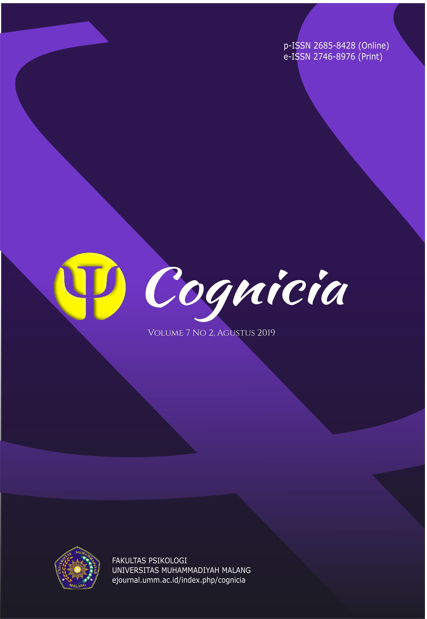Improving self-efficacy in musical performance using socratic dialogue
DOI:
https://doi.org/10.22219/cognicia.v7i2.9424Keywords:
Musical Self-Efficacy, Socratic Dialogue, MSLQAbstract
This research try to investigate the effect of promoting self-efficacy to musical performance in a student, which had been done by explaining the student about the concept of self-efficacy, and a series of Socratic dialogue. This educational intervention was done to a junior high school student (X). Pre and post intervention measuring test were done using Pintrich and Groot’s Motivated Strategies for Learning Questionnaire (1990) that had been adapted to suit the context of music education. This study found that improving self-efficacy level in a student using Socratic Dialogue does have positive effect on musical performance and practice
Downloads
References
Bandura, A. (1993). Perceived self-efficacy in cognitive development and functioning. Educational psychologist, 28(2), 117-148.
Bandura, A., & Wessels, S. (1997). Self-efficacy (pp. 4-6).
W.H. Freeman & Company. Bandura, A. (2006). Guide for constructing self-efficacy scales. Self-efficacy beliefs of adolescents, 5(1), 307-337.
Bruning, R. H., Schraw, G. J., Norby, M. M., & Ronning, R. R. (2003). Cognitive psychology and instruction. Prentice-Hall, Inc., One Lake Street, Upper Saddle River, NJ 07458.
Cassidy, S. (2015). Resilience building in students: the role of academic self-efficacy. Frontiers in psychology, 6, 1781.
Duckworth, A. L., Peterson, C., Matthews, M. D., & Kelly, D. R. (2007). Grit: perseverance and passion for long-term goals. Journal of personality and social psychology, 92(6), 1087.
Freeman, A. (2005). Socratic dialogue. In Encyclopedia of cognitive behavior therapy (pp. 380-384). Springer, Boston, MA.
Judge, T. A., & Bono, J. E. (2001). Relationship of core self-evaluations traits—self-esteem, generalized self-efficacy, locus of control, and emotional stability—with job satisfaction and job performance: A meta-analysis. Journal of applied Psychology, 86(1), 80.
Kazantzis, N., Fairburn, C. G., Padesky, C. A., Reinecke, M., & Teesson, M. (2014). Unresolved issues regarding the research and practice of cognitive behavior therapy: The case of guided discovery using Socratic questioning. Behaviour Change, 31(1), 1-17.
McPherson, G. E., & McCormick, J. (1999). Motivational and self-regulated learning components of musical practice. Bulletin of the Council for Research in Music Education, 98-102.
McPherson, G. E., & McCormick, J. (2000). The contribution of motivational factors to instrumental performance in a music examination. Research Studies in Music Education, 15(1), 31-39.
McCORMICK, J., & McPHERSON, G. (2003). The role of self-efficacy in a musical performance examination: An exploratory structural equation analysis. Psychology of Music, 31(1), 37-51.
McPherson, G. E., & McCormick, J. (2006). Self-efficacy and music performance. Psychology of music, 34(3), 322-336.
Miksza, P., & Tan, L. (2015). Predicting collegiate wind players’ practice efficiency, flow, and self-efficacy for self-regulation: An exploratory study of relationships between teachers’ instruction and students’ practicing. Journal of Research in Music Education, 63(2), 162-179.
Nielsen, S. G. (2004). Strategies and self-efficacy beliefs in instrumental and vocal individual practice: A study of students in higher music education. Psychology of Music, 32(4), 418-431.
Pintrich, P. R., & De Groot, E. V. (1990). Motivational and self-regulated learning components of classroom academic performance. Journal of educational psychology, 82(1), 33.
Ritchie, L., & Williamon, A. (2011). Measuring distinct types of musical self-efficacy. Psychology of Music, 39(3), 328-344.
Ritchie, L., & Williamon, A. (2007, November). Measuring self-efficacy in music. In Proceedings of the International Symposium on Performance Science (pp. 307-312).
Vyskočilová, J., & Praško, J. (2012). Socratic dialogue and guided discovery in cognitive behavioral supervision. Activitas Nervosa Superior Rediviva, 54(1).
Zimmerman, B. J. (2000). Attaining self-regulation: A social cognitive perspective. In Handbook of self-regulation (pp. 13-39).
Zimmerman, B. J. (2000). Self-efficacy: An essential motive to learn. Contemporary educational psychology, 25(1), 82-91.
Downloads
Published
How to Cite
Issue
Section
License
Copyright (c) 2019 Imanuel Ezra

This work is licensed under a Creative Commons Attribution-ShareAlike 4.0 International License.
Authors who publish with Jurnal Cognicia agree to the following terms:
- For all articles published in Jurnal Cognicia, copyright is retained by the authors. Authors give permission to the publisher to announce the work with conditions. When the manuscript is accepted for publication, the authors agree to automatic transfer of the publishing right to the publisher.
- Authors retain copyright and grant the journal right of first publication with the work simultaneously licensed under a Creative Commons Attribution-ShareAlike 4.0 International License that allows others to share the work with an acknowledgment of the work's authorship and initial publication in this journal.
- Authors are able to enter into separate, additional contractual arrangements for the non-exclusive distribution of the journal's published version of the work (e.g., post it to an institutional repository or publish it in a book), with an acknowledgment of its initial publication in this journal.
- Authors are permitted and encouraged to post their work online (e.g., in institutional repositories or on their website) prior to and during the submission process, as it can lead to productive exchanges, as well as earlier and greater citation of published wor (See The Effect of Open Access).

This work is licensed under a Creative Commons Attribution-ShareAlike 4.0 International License







